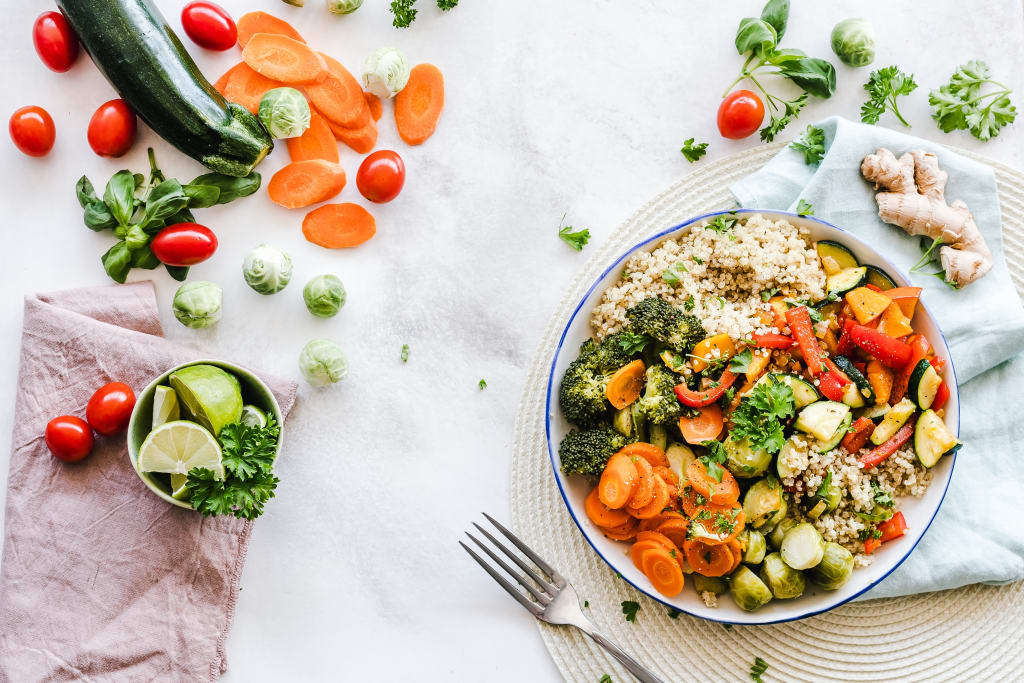
The secret to a balanced diet is to ingest the proper number of calories for your level of activity, balancing the amount of energy you take in with the amount you expend.
You will gain weight if you consume more food or liquid than your body requires since the extra energy is stored as fat. You will lose weight if you consume too little food and liquids.
To ensure that you are eating a balanced diet and that your body is getting all the nutrients it needs, you should eat a variety of foods.
Men should consume about 2,500 calories every day. (10,500 kilojoules). Women need about 2,000 calories every day. (8,400 kilojoules).
1. Invest in more fibrous, starchy carbohydrates for your meals
Just a little bit more than one-third of your diet should consist of starchy carbohydrates. Potatoes, bread, rice, pasta, and cereals are among them.
Select products with more fibre or wholegrain content, including wholewheat pasta, brown rice, or potatoes that still have their skins on.
Compared to white or refined starchy carbohydrates, they have more fibre and can make you feel fuller for longer.
With each main meal, try to incorporate at least 1 starchy food. Although some people believe that starchy meals make you fat, they actually contain less calories per gramme of carbohydrate than fat.
Watch the fats you add when preparing or serving these kinds of foods because they are what raises the calorie count, such as oil on chips, butter on toast, and creamy sauces on pasta.
2. Eat a lot of fruit and vegetables

You should consume at least 5 portions of different fruits and vegetables each day, according to recommendations. They can be juiced, dried, tinned, frozen, or fresh.
Getting your recommended five a day is simpler than it sounds. Why not add some chopped banana to your morning porridge or replace your go-to mid-morning treat with some fresh fruit?
Fresh, canned, or frozen fruit and vegetables are each 80g in size. A serving of dried fruit is 30g, which should only be consumed with meals.
A 150 ml glass of fruit juice, vegetable juice, or smoothie counts as 1 serving as well, however, you should only eat 1 glass of these sweet beverages per day to prevent tooth decay.
3. Increase your fish intake, especially oily fish.

In addition to having a lot of vitamins and minerals, fish is a wonderful source of protein.
Try to eat at least two meals of fish every week, at least one of which should be oily.
Omega-3 fats, which are abundant in oily fish, may aid in the prevention of heart disease.
4. Reduce your consumption of sugar and lard
- Saturated fat
You need some fat in your diet, but you need to watch how much and what kind of fat you consume.
Saturated and unsaturated fats are the 2 main types. Overconsumption of saturated fat can raise blood cholesterol levels, which raises your risk of heart disease.
Men should consume no more than 30g of saturated fat per day on average. Women should consume no more than 20g of saturated fat per day on average.
Although children under the age of five should not have a low-fat diet, children under the age of 11 should consume less saturated fat than adults.
Try to consume fewer foods high in saturated fat and more foods high in unsaturated fats, such as oily salmon, avocados, and vegetable spreads.
Use a little vegetable, olive, or low-fat spread in place of butter, lard, or ghee for a healthier option.
Cut out all apparent fat when eating meat, and choose lean cuts.
Since all forms of fat are heavy in calories, they should only be consumed in moderation.
- Sugar
Consuming sugary meals and beverages on a regular basis raises your chances of obesity and tooth damage.
Sugary foods and beverages frequently contain significant amounts of energy (measured in calories or kilojoules), which, if consumed too frequently, can lead to weight gain. Furthermore, especially if consumed between meals, they can result in tooth decay.
Free sugars are all sugars that are either naturally occurring in honey, syrups, unsweetened fruit juices, and smoothies or added to foods or beverages.
You should limit this kind of sugar rather than the sugar included in fruit and milk.
Surprisingly large levels of free sugars are present in many packaged meals and beverages.
5. Consume no more than 6g of salt per day for adults
Your blood pressure can increase if you consume too much salt. Heart disease and stroke are more likely to occur in those with high blood pressure.
You can be eating too much even if you don't salt your food.
When you purchase foods like breakfast cereals, soups, breads, and sauces, around three-quarters of the salt you consume is already present.
To save money, use the labels on your food. A food is rich in salt if it contains more than 1.5g of salt per 100g.
No more than 6g (or roughly a teaspoonful) of salt should be consumed daily by adults and children aged 11 and older. Even less should be given to younger kids.
6. Avoid skipping breakfast.
Some people believe skipping breakfast may aid in their weight loss.
However, a balanced diet that includes a healthy breakfast that is high in fibre and low in fat, sugar, and salt will help you get the nutrients you need for optimal health.
A pleasant and healthier meal is a bowl of whole grain, lower sugar cereal with semi-skimmed milk and fruit slices on top.






Comments
There are no comments for this story
Be the first to respond and start the conversation.